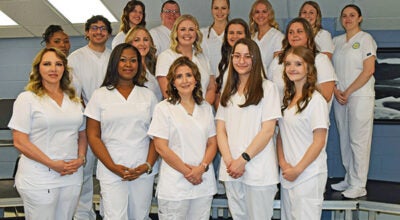Local health care facilities prepare for the next generation
Published 11:39 am Monday, February 1, 2010
By JESSICA SIEFF
Niles Daily Star
As the City of Niles continues to see the opportunity for growth flourish, so does the township see an opportunity for growth within its own population.
Niles Charter Township Supervisor Jim Kidwell and City Administrator Terry Eull talked last week to the Star about the future of their respective jurisdictions.
And across the country, a significant portion of that population is getting older.
Hence, the reason for the health care debate, which stands to affect the aging and elderly and the baby boomer generation that will have a significant impact on health care services in the future.
Services like assisted living facilities and home health care services.
“They are still looking for independence,” said Mary Dockerty, co-founder of Woodland Terrace at Longmeadow, an assisted living facility in Niles Township, just off Niles-Buchanan Road.
“I think that people are looking for more apartment type places,” she said, including their own kitchen space as opposed to facilities where residents have just one room.
Dockerty said she has observed that people are waiting a little longer before moving into a facility like Woodland Terrace, but there remains the issue of the possibility of emotional or mental decline that stems from isolation.
“The idea of intergenerational activity is something we’ve incorporated by having a lot of different programs,” which are geared toward getting grandchildren and families to visit and even include visits by students.
Isolation, multiple medication usage and an intergenerational connection were all critical topics covered in a July 2009 conference held by the American Society on Aging.
“One of the things we have currently at our Woodland Terrace in Bridgman is the (Nintendo) Wii which a lot of the kids are into,” Dockerty said. “We try to incorporate activities and have things available so there can be a lot of participation between the young people.”
Niles Township saw the recent development of Woodland Terrace utilize the physical acreage and space available, creating a structural community that even includes a town square, giving residents a feeling of freedom and independence.
“I feel that’s very important,” she said. “In fact I’ve had people ask me when they come looking for a place, they’ll ask, ‘Well, can we go out whenever we want to?'”
The economy not a bit player, the need for independence could also be behind the reason why so many elderly want to stay in their own homes.
And behind the push for national health care reform.
“Just like the government is saying, we are getting older and health care isn’t going to get any cheaper,” said Lori Summerfelt, patient care manager with Lakeland Homecare.
Lakeland Homecare provides several services to clients outside of the hospital, from wound care management to rehabilitation, nutrition and other various home care services.
The future of health care is undetermined at best. But there are a few certainties.
In general, Americans seem to be living longer, meaning despite what one thinks about health care reform, health care itself is more in demand.
“We see the client in their home because they can’t get out and go to outpatient services, they’re too frail for that kind of activity,” Summerfelt said.
Occupational therapists, bath aides and speech therapists go into a client’s home to help them with individual issues they’re facing.
With an economy that has put a strain on retirement funds and personal savings, those who opt out or can’t afford an assisted living facility can benefit from programs offered like those of Lakeland Homecare.
“It’s not only a matter of money,” Summerfelt said. “People are more comfortable around their own surroundings.”
For her part, Summerfelt said she can’t say that needs are actually changing, rather, there are simply more people with those needs.
Through home care services, “we do monitor and teach clients in their homes,” and trained nurses and staff are then able to observe “those subtle signs that nurses can pick up on,” which allow for better care of the client.
“We treat the whole person,” she said.
As communities grow, so will accessibility to such services.
The need won’t go away and – to the relief of some – Summerfelt said neither will the care.
“I don’t see our services going away,” she said. “No matter what the health care arena brings.”






